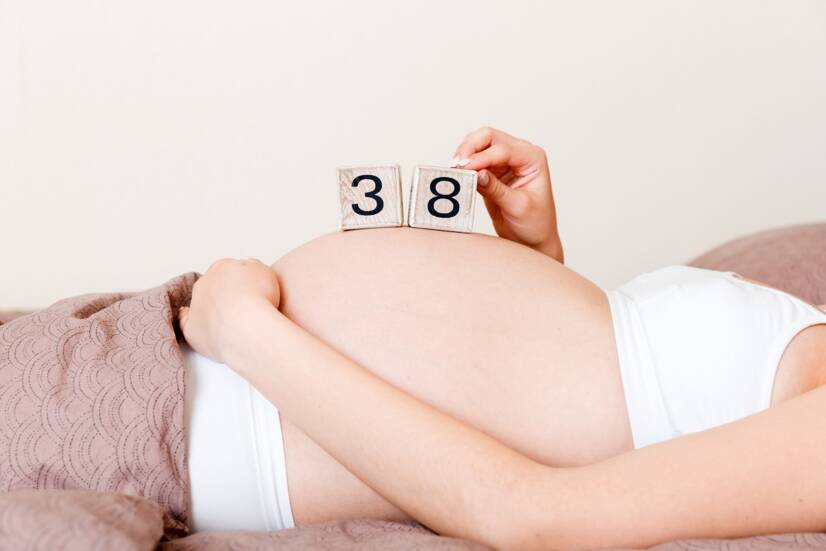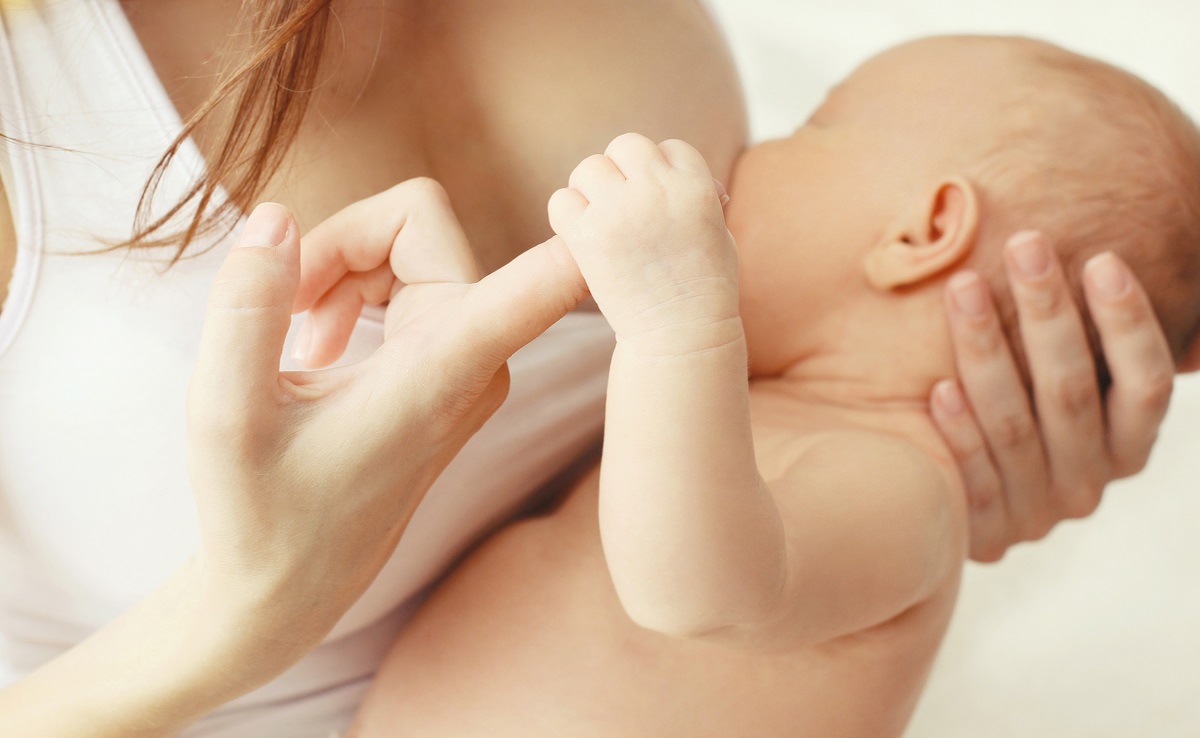- nspnz.sk - Breast milk and its production
- nhs.uk - A week by week guide to pregnancy
- whattoexpect.com - 38th week of pregnancy
- verywellfamily.com - 38th week of pregnancy
38th week of pregnancy: have you thought about whether you will breastfeed?

At the 38th week of pregnancy, the fetus is already fully developed and ready for birth.
Article content
You are already 38 weeks pregnant, 9 months and 2 weeks into your third trimester. You are just 2 weeks away from your expected due date. Your due date is approaching. You are almost at the end of your pregnancy.
Your baby is now fully developed, delivered and could be born at any time.
You are only two weeks away from your due date. Your baby may decide to come into the world now, but your due date may also be extended by up to 4 weeks.
How is your baby developing in your tummy?
At 38 weeks, all of your baby's systems are working.
Its approximate length is 49 cm and its weight is 3080 g.
However, the brain and nervous system are still being refined to cope with all the stimuli once it comes into the world.
The baby continues to gain weight and store fat in the subcutaneous tissue.
Before birth, the fetal skin becomes taut, pink, red and smooth.
Most of the lanugo has disappeared from the body. Only the back and shoulders remain, where it disappears after birth.
The vernix remains on the skin, which protects the skin of the fetus from amniotic fluid and will continue to protect it after birth.
The baby's skin is smoothed, all the folds and small wrinkles are filled with fat.
If you're expecting a boy, the testicles will protrude into the scrotum. If you're expecting a girl, the labia majora will cover the labia minora.
The circumference of the head and chest is the same.
His intestines continue to accumulate tar. The tar is the first stool that comes out after birth.
The bowel cleansing is set in motion after the first breast milk, colostrum, is received. The colostrum stirs up the colostrum and thus starts the bowel movement and functionality.
In some cases, there may be secretion of the colostrum during pregnancy, into the amniotic fluid. This is not a good sign. The amniotic fluid turns green and endangers the fetus.
The baby's eyes are currently blue, grey or brown. After birth, they may change shade in direct sunlight. However, we will not know the true colour of the baby's eyes until the baby is 1 year old, when the colour of the baby's eyes will remain the same.
The lungs develop and strengthen. The vocal cords develop. The baby prepares to communicate with you by crying and making sounds.
The toenails are outgrowing the tips of the toes and the feet are already ridged.
The baby sleeps a lot during this period. When he is awake, he looks around. He tries to grab everything he can reach with his fingers, blinks his eyes, sucks his finger and sucks the amniotic fluid.
By sucking and swallowing amniotic fluid, she is preparing to receive food after birth. If she swallows too much water, you may see your tummy periodically rise. The baby inside your tummy has hiccups.
Its digestive system is already able to take in food in liquid form.
It expels the amniotic fluid it drinks at regular intervals.
The placenta is ageing and its function will soon cease.
The table shows the approximate dimensions of the fetus at 38 weeks, as measured sonographically
| Total length | Weight | HC Head circumference | BPD Transverse diameter of the head | AC Abdominal circumference | FL Femur length |
| 49.8 cm | 3080 g | 328.1 mm | 93.6 mm | 331,6 mm | 69,4 mm |
For more information on fetal size, see the article:
Ultrasound in pregnancy: fetal size, what is fetal biometry?
How does a woman feel at 38 weeks?
Your weight is not increasing as much as in the previous months. The weight gain is small. You are no longer gaining weight, only your baby is.
Your abdomen is slowly dropping. You've noticed that you're breathing more freely and easily.
The drop in your abdomen is caused by the pressure of the fetal head on your bladder.
Your belly button is pointing outward, bulging.
Your breasts are still filling with breast milk. You may notice that the colostrum leaves your nipples as a yellow fluid.
Your skin is more oily and pregnancy spots are appearing.
Your skin is dry, tight, especially in the tummy area, and itchy. Use creams regularly to moisturise your skin and prevent itching.
Colostrum is produced by the mammary gland within 72 hours after birth. It is very important for the newborn to build its immunity, and contains many vitamins. It removes the smolka (first stool) from the intestines because it has a laxative effect. Thus, it helps to expel it.
The baby is still moving at intervals as before. The movements are not as intense, but they are still noticeable. Despite the change in the types of movements, their frequency should remain the same.
If you notice changes in the baby's movements, it is a good idea to inform the doctor. He will check that everything is developing as it should.
In addition, even in this week of pregnancy, you may be troubled by insomnia and a feeling of lack of sleep.
Your tummy is large. Sometimes it is difficult to find a comfortable sleeping position. Turning over in bed with your tummy is sometimes problematic. When you finally get comfortable to sleep, your bladder forces you to get out of bed and go to the toilet.
You also wake up more often, which shows up during the day in the form of fatigue.
Insomnia can be compounded by your mind working so intensely that you have trouble falling asleep. Try picking up a book or magazine and reading. It will keep you occupied. You'll think different thoughts and it will calm you down.
It's normal if you're already impatient and anxious.
You may feel bloated and swollen in your legs, retaining water in your body. This is all normal because of hormones. When you find a moment to rest, put your feet on a pillow and the swelling will go down. Avoid standing for long periods, sitting and don't wear tight clothes.
Your gait becomes uncomfortable, wobbly. The baby's head presses against the pelvis.
You may experience back pain more often, pain in the side from the growing uterus and increasing pressure from the baby.
Digestive problems such as heartburn have subsided. You may still experience bloating and constipation.
Swollen and bleeding gums often appear after teeth cleaning.
Headaches and dizziness may also occur. Remember to take plenty of fluids.
You may notice vaginal discharge, which is common in the last trimester of pregnancy. It accompanies impending childbirth.
The discharge should be clear or slightly tinged with yellow. Towards the end of pregnancy and with the pressure of the head on the birth canal, your cervix may dilate. You may have pink or brown discharge from the bursting of the delicate blood vessels of the cervix.
If you notice discharge of a different colour or itching around the genitals, it may be an infection. Infection is common, especially in the last month of pregnancy. Your body is more prone to infections. In this case, contact your gynaecologist. He will examine you and prescribe gentle medicines to relieve the symptoms and eliminate the infection.
You may notice a mucus plug oozing out as a small amount of thick mucus, sometimes with a mixture of blood.
To learn more about mucus plugs, see our article:
Mucusplugs in pregnancy. When do they form, what do they look like and how do they disappear?
Incoming messengers are appearing more and more often.
You notice every symptom. You wait to see if labor is about to begin.
The first signs of labor beginning may be the passing of a mucus plug, amniotic fluid draining in drops, or all at once.
You may feel the pressure of the baby sinking into the pelvis, discomfort.
Pain, cramps in the abdomen or sacrum.
The appearance of mucus may also indicate impending childbirth.
If you experience severe pain or vaginal bleeding or if your baby does not move at all, visit the nearest hospital immediately.
When you start to feel contractions, it's a good idea to watch the intervals at which they come.
When the messengers come, the uterine contractions start to become more frequent. If they come regularly, their frequency increases, they gain intensity and the time between them shortens, then you are getting closer to giving birth.
The contractions can start even without your amniotic fluid draining.
If they are regular, it's time to go to the hospital and get checked to see if they are labor or false contractions.
Are you worried about getting to the hospital on time, worried about the pain, worried about complications? Don't worry and don't worry unnecessarily. Try to stay calm. When the first signs of labour start, you will feel them and go to the hospital.
For more information about the start of labour, see our article:
When does labour start? And an even more important question: when does it end?
If you are expecting twins and have made it this far, congratulations.
As early as 38 weeks, a pregnancy with twins is considered carried to term.
The twins, although slightly smaller, are fully developed. The placenta is already losing its function. This will likely lead to you being scheduled for a cesarean delivery in the near future.
Most twins are born in the previous weeks, up to 50% before 37 weeks. You will soon be holding your babies in your arms.
What can you observe?
Have you noticed that you're a little clumsy?
Your movements are not as graceful as they used to be. This is not only due to the growing tummy, but also with the weight gain, loosening of joints and ligaments. Don't worry about it. Everything will return to normal after the birth, which will come soon.
You may feel irritable and have mood swings. You're scared of giving birth. You're always wondering what it will be like, what it will be like to have a baby at home, how you'll cope.
Don't worry, put your fears and worries aside. Try to rest a lot. Take time for yourself, have everything ready. When the baby is born and you bring it home, all your fears will disappear.
He will need nothing but the basic equipment, you and your love. Everything else you can buy later.
What tests are you going to have at 38 weeks?
You will visit the clinic once a week. If you are expecting twins, twice a week. Now you don't know which week at the clinic is your last.
Examinations are carried out as in the previous week.
At the clinic, they will take your weight, blood pressure, check your urine. The doctor will check for swelling, monitor the cervix and its consistency. He will monitor the fetal heart sounds, its position, take a CT scan. If you have any questions, feel free to ask him and he will answer them.
If the doctor suspects complications during labor or the fetus is placed transversely, pelvic end or at the end of the placenta, you will be scheduled for a cesarean delivery.
Prior to your scheduled cesarean delivery, you will need to undergo an internal pre-operative evaluation. Your medical history will be taken, blood pressure will be taken, blood tests will be done, and an EKG will be performed. An internist will review the results and assess your heart condition and health. You will be sent to an anesthesiologist with the results. The anesthesiologist will determine the risk of anesthesia performed during surgery.
The cesarean section may be performed under general anesthesia, where you will be put into an artificial sleep, or under spinal anesthesia, where the lower part of your body is numbed and you will be fully conscious. Overall, a cesarean section can take up to an hour, but can take as little as 30 minutes.
What if the baby is born now?
Giving birth at 38 weeks is common. Many women give birth to a healthy premature newborn of normal birth weight and length just this week.
Your baby is not at risk. It is considered premature.
What we can recommend to you
- Eat adequately, small portions and more often. Eat foods that do not cause gas.
- Eat healthy foods, add fresh vegetables and fruit.
- You should not forget to get plenty of exercise, go for walks, get some fresh air. A walk will help you clear your head and change your thinking.
- Wear comfortable clothes that do not press, and comfortable shoes.
- Your movements are slower, so don't rush anywhere.
- A maternity belt will help reduce pressure on your pelvis.
- Practice pregnancy exercises, pregnancy yoga is very good.
- Drink plenty of fluids to keep yourself and your baby hydrated, which will also prevent dizziness.
- Relax, rest, take time for yourself. You will have much less time after the baby arrives.
- Practice Kegel exercises.
- Now it is important that you try to be in good emotional and mental well-being.

You may ask why breastfeed?
You are already thinking about whether you will breastfeed your baby or whether you would rather feed him with artificial milk. The decision is yours.
Breastfeeding has more advantages than artificial milk. Breast milk is always at hand, always at the right temperature, does not need to be mixed and heated. Compared to artificial milk, it is up to 4 times more digestible.
What does breast milk contain?
Breast milk contains all the nutrients that best cover the needs for a baby's development and growth.
Colostrum is the first milk that is formed after birth within 72 hours. It is yellowish in colour and has a laxative effect. It helps to cleanse the colon of bad breath.
Colostrum contains immunoglobulins, growth hormones, iron-binding proteins, vitamins, minerals, trace elements, amino acids, enzymes.
After colostrum, mature milk is formed. It is white to bluish in color and contains more fat needed to keep the baby full and enough fluid to keep the baby from being thirsty.
It is the optimal diet for a baby up to 6 months of age. It varies according to the baby's needs. It contains all the nutrients the baby needs.
When you put the baby to the breast, he drinks first the front milk, which is thinner and quenches the baby's thirst. Then the back milk is released, which is thicker and fills the baby.
To learn more about the other weeks of pregnancy, see the summary article:
Pregnancyby weeks: How does pregnancy and fetal development work?
Gallery

Interesting resources
Related










